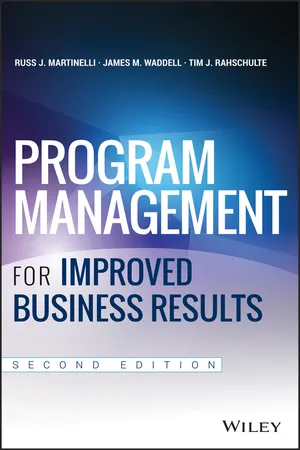
Program Management for Improved Business Results
Russ J. Martinelli, James M. Waddell, Tim J. Rahschulte
- English
- ePUB (apto para móviles)
- Disponible en iOS y Android
Program Management for Improved Business Results
Russ J. Martinelli, James M. Waddell, Tim J. Rahschulte
Información del libro
Superior program management begins with superior information and strategy
Program Management for Improved Business Results, Second Edition is a practical guide to real-world program management, written to align with the rigorous PMI® PgMP® certification standards. The book explains the benchmarks and best practices that help shape a superior program manager, and provides case studies that illustrate the real-world application of management concepts. Written by a team composed of both industry professionals and academics, the book strikes a balance between theory and practice that facilitates understanding and better prepares candidates for the PgMP. Managers at all levels will learn the insights and techniques that are shaping modern management expectations.
The Project Management Institute and the Product Development and Management Association both agree that program management is a critical element in the successful integration of business strategy and project management. The certification process is difficult, and few complete it – but demand for competent professionals is high. Program Management for Improved Business Results addresses this disconnect, preparing readers to fill the gaps and help businesses achieve the level of program management integration required by professional organizations. Topics include:
- Aligning programs with business strategy
- Program planning, execution, and processes
- Management metrics and strategic and operational tools
- Roles, responsibilities, and core competencies
The book focuses on both the macro and the micro levels, explaining the successful integration of business strategy with project portfolios as well as the managing of a single program. Case studies present both issue-oriented and comprehensive perspectives, and guidance includes real, actionable steps. For professionals seeking improved program outcomes, Program Management for Improved Business Results is a roadmap to exceptional management skills.
(PMI and PgMP are registered marks of the Project Management Institute, Inc.)
Preguntas frecuentes
Información
Part I
It's About the Business
Chapter 1
Program Management
Definitions and Context
Programs Defined
Program Management Defined
Program Management Definition
Índice
- Cover
- Title Page
- Copyright
- Dedication
- Preface
- Acknowledgments
- Part I: It's About the Business
- Part II: Delivering the Whole Solution
- Part III: Program Practices, Metrics, and Tools
- Part IV: The Program Manager
- Part V: Organizational Considerations
- Appendices: Case Studies in Program Management
- More from Wiley
- Index
- End User License Agreement